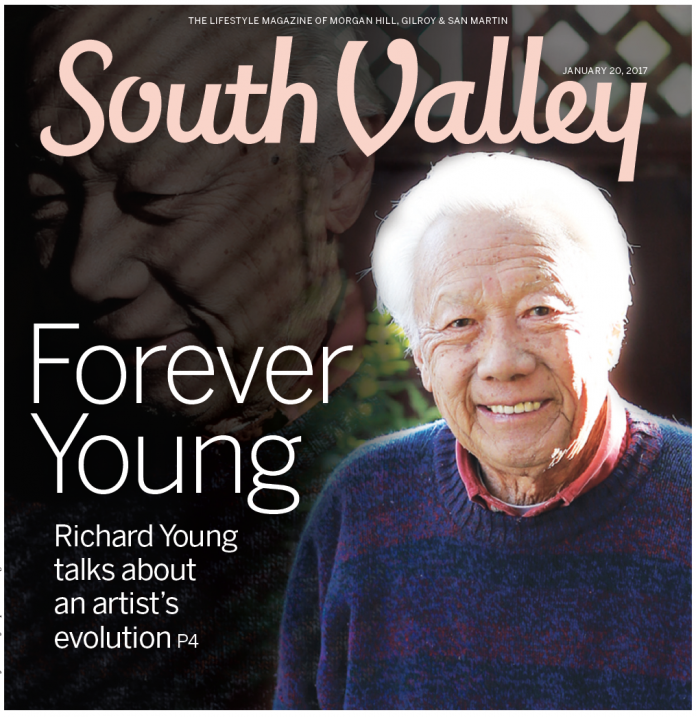
The mood went from dawn to dusk, a collection of contemporary paintings spanning the brilliance of an entire day in Monterey.
“I call the series ‘Toward Tranquility,’ says artist and avid runner Richard Young, whose work is now being displayed at the Gilroy Center for the Arts.
When Young was asked to showcase his work at the Monterey Museum of Art he knew he wanted a theme than connected him with Monterey.
“I go down there and I run,” says Young. “And there are days that I go to Monterey and it’s all totally fogged in. You hear things out there. You know there are things out there, but you don’t see them.”
The series—a collection of 26 5-foot by 5-foot original works of art—begins with scenes of the early morning twilight into the coastal foggy pinks of dawn, to the high sun hidden behind a veil of fog, to the fall of dusk and into deep blues and black of night.
Young, 82, took three years to complete sequence, which was originally on exhibit at the Monterey Museum of Art in 1985.
The works being shown in Gilroy represent only a portion of Young’s original exhibit, ‘Toward Tranquility’ as well as additional sculpture and watercolor pieces.
A descendent of one of the Gilroy’s premier Chinese pioneer farming families, Young was born and raised in Gilroy. He attended college at Hartnell Junior College in Salinas, where he received an A.A. in commercial art and continued onto San Jose State earning a B.F.A. and finally, a master’s in painting.
Owner of Young Signs on Eigleberry, Young took over the business from his father Elmer Young. Young became acquainted with Kevin Heath executive director for the Gilroy Center for the Arts when he was hired to create the signage on the Center building and the lights marquee.
“While working on these projects, I visited his shop and showed me his work,” says Heath. “We’ve been talking, since then, about showing his work at the Center.”
Young is excited about bringing a contemporary art show featuring his earlier style to Gilroy. The original exhibit, like Young’s sense of personal expression, is about evolution.
Young says that art is meant to change and should reflect the changes an artist experiences.
“Certain shapes give certain emotions,” says Young. “The time there—even though you don’t see them—there are certain feelings and certain emotions from the noise made.”
“I have a color field from off-white to black of 26 paintings and each one has a different emotion to it,” he says “And that’s how this series goes—instead of just putting shapes and colors—there’s a reason behind those colors.”
When Young was asked to show his work at the Center for the Arts, he says he was primarily interested in showing contemporary art in the city of Gilroy. Young says his early pieces are pretty representational and his goal is to show young artists how he’s changed over the years.
“In being an artist you change,” says Young. “That’s the whole purpose, I feel, of the show.”
In addition to “Toward Tranquility,” an acrylic on canvas series, Young’s work runs a broad spectrum of textures and mediums including wood, watercolor, sculpted paper, Lucite and neon lights, and metal.
Heath is interested in introducing more work like Young’s to the area.
“His paintings, watercolors and sculpture are unique,” says Heath. “It reminds me of art galleries and museums I attended in Manhattan when I lived there. Contemporary art is not something everyone understands, but he has a way of communicating the emotion without words.”
“I want to showcase his work because it is different than anything we have exhibited,” says Heath. “It hits one of the strongest parts of our mission. Education. There are so many ‘types’ of art, and many people in our community do not have the opportunity to see the spectrum of work. It also will draw our patrons from other communities and cities.”
Early in his career, Young was directed away from art, but he refused the suggestion.
“After I’d shown my small watercolors,” says Young. “Someone told me early on when I started ‘You’re wasting your time painting.’ And I went back with a series of these. And they loved it.”
The redirection galvanized Young’s passion and his persistence paid off. One watercolor of Young’s was a brown hued watercolor. But this wasn’t just paint on paper, Young was able to recreate the look and texture of tanned leather. Young added further complexity to the piece by creating fissures in the paper to bring an increased element of texture to the painting.
As a former instructor at Gavilan, Young is very interested in introducing art to young artists. Heath says many of the students who learned under Young have grown up to become talented artists themselves.
“A great example is JoAnne Perez-Robinson, who was in our first exhibit of 2017,” says Heath. “His teaching and his personal work have been part of the local landscape of art for decades.”
“I would like to have a show for young artists to see how an artist grows and how you have to change,” says Young.
If an artist doesn’t grow in their art, they simply stagnate says Young. Change is a necessary evolution in any artist’s work.
Young says the pieces he creates are designed to elicit certain feelings and his intention is for the viewer engage with the piece on some level. He speaks of one as “A great piece. It was pieces like this that I began to work into that I developed real pieces that touch your sensibilities.”
Gilroy Center for the Arts presents Contemporary Art by Richard Young from Jan. 21 to Feb. 19 at the Center for the Arts on 7341 Monterey St. Join the reception on Saturday, Jan. 21 from 2 p.m. – 5 p.m. Admission to the Gallery and Reception is free. Visit gilroycenterforthearts.com.
Correction: We regret misidentifying the Mr. Young on the cover of the print version of this article. His name is Richard Young.
Contemporary art is not something everyone understands, but he has a way of communicating the emotion without words












